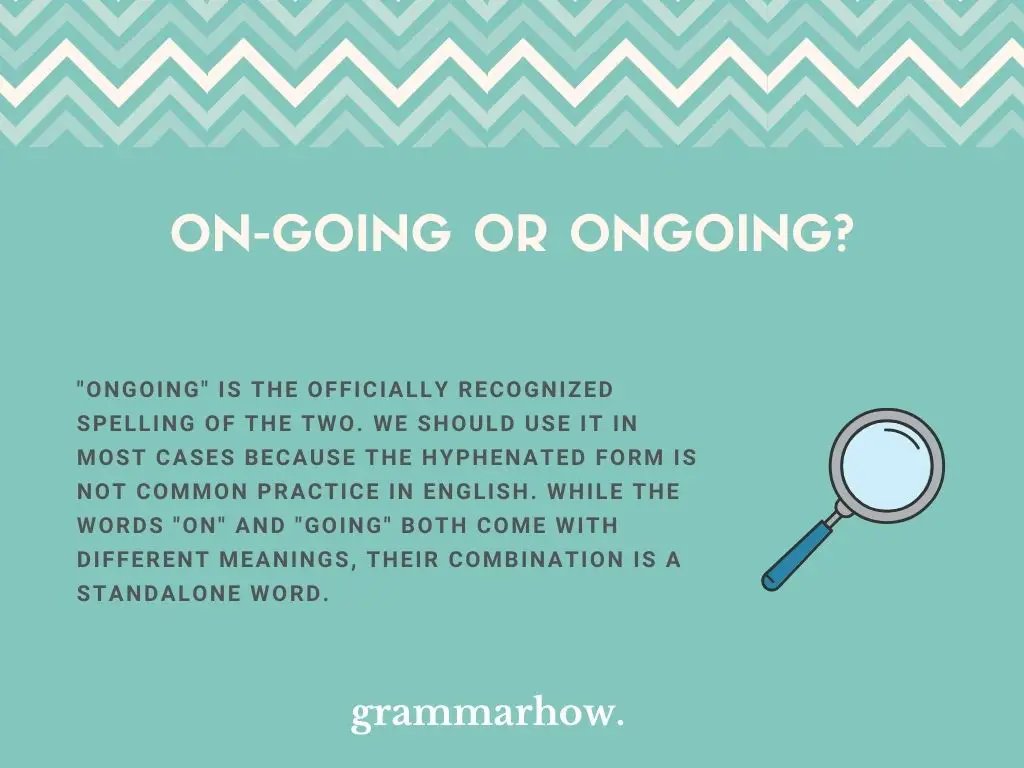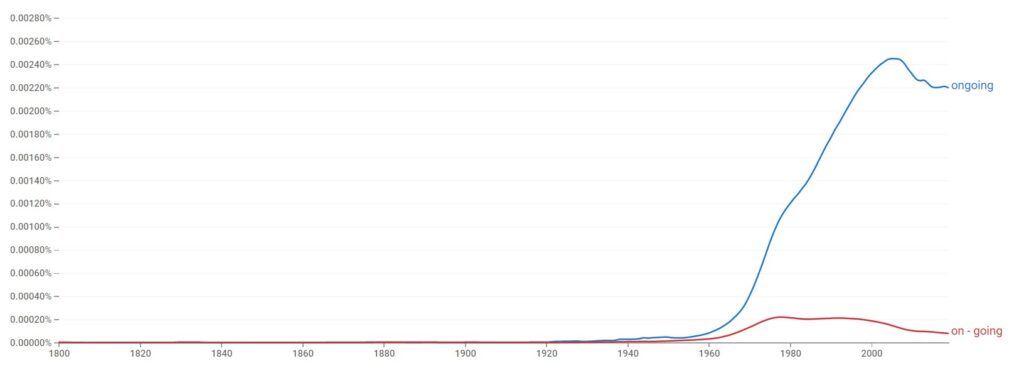Knowing whether “ongoing” is one or two words is important to help you master English. This article will explore whether it’s hyphenated or whether you keep it as one word. Once you’ve read all the rules here, you should have more luck with it.
On-going vs. Ongoing
“Ongoing” is the officially recognized spelling of the two. We should use it in most cases because the hyphenated form is not common practice in English. While the words “on” and “going” both come with different meanings, their combination is a standalone word.

Since English writers use “ongoing” as the only acceptable spelling, it would be helpful to see some statistics to support that:
According to Google Ngram Viewer, “ongoing” is by far the most popular spelling choice. Compared to the hyphenated variation, “ongoing” is the only acceptable variation, and you should make sure to use it as one word.

In The Cambridge Dictionary and The Oxford Dictionary, “ongoing” is recognized as one word. They only define it as one word, and there are no exceptional circumstances where “on-going” is correct.
Is “On-going” Hyphenated?
“On-going” is not a hyphenated word. It has never been hyphenated in the past (unlike other hyphenated words, which tend to lose the hyphenation when English evolves). You should avoid using this variation as there is no time where it makes sense in English.
While it might seem sensible to hyphenate the two words “on” and “going,” the word “ongoing” is already defined; therefore, it is unnecessary.
If it was not officially spelled that way, a hyphen might be more useful to us. However, since it is accepted as one word, there is no need to include a hyphen.
So, let’s make sure you remember this information by checking out the following examples:
- Correct: The ongoing investigations should take place at some point in the near future.
- Incorrect: The on-going scenario isn’t something I wanted to be a part of, but my boss insisted.
- Correct: The ongoing trials are difficult to wrap my head around. I really don’t care about them!
- Incorrect: I think the on-going crisis that affects our world daily is much too painful to forget about.
There are no cases where “on-going” is a hyphenated word.
Is “Ongoing” One Word?
“Ongoing” is one word. While it combines two separate words, the English language recognizes their combined form as one that is acceptable and comes with its own meaning. If you’re going to use the word, make sure to remember to keep it as a one-word spelling.
It’s reasonable for some people to think that “ongoing” should be hyphenated. We’ve already explained that it’s common for English to evolve over time and drop hyphens when two separate words combine to become one.
However, since “ongoing” has always been considered a word, there’s no point in adding in a hyphen. If anything, it’ll just confuse native writers who are not used to seeing the hyphen.
It might help you to check out some of these examples to see how it works:
- Don’t worry, buddy. My talks are ongoing, and I’ll be sure to find out who did this to you soon.
- The investigations are all ongoing, and I do not think I can divulge any more at this time.
- You shouldn’t worry! My ongoing investigation is nearing its natural end, and I’ll have an answer for you then.
- While ongoing, I thought it was time for you to learn a little more about what’s happening right now.
- The ongoing trial is happening in the courtroom. It seems like the defendant is losing!
As you can see, “ongoing” is one word in all cases. It’s best if you remember this when you’re trying to use it yourself.
Is “Going” Capitalized In The Word “On-Going”?
Usually, we dedicate this part to the capitalization of the hyphenated word. However, since “on-going” is not an official spelling variation, there is no need for us to discuss whether “going” should be capitalized as part of it or not.
As a quick note, “ongoing” as a one-word spelling still does not need to be capitalized. It is not a proper noun, so capitalization is unnecessary. The only time where it might be used is when “ongoing” is included as part of a title.

Martin holds a Master’s degree in Finance and International Business. He has six years of experience in professional communication with clients, executives, and colleagues. Furthermore, he has teaching experience from Aarhus University. Martin has been featured as an expert in communication and teaching on Forbes and Shopify. Read more about Martin here.
